Database Collection
SearchBlox allows you to easily index records from the database table, and results are customizable with Faceted Search.
Creating a Database Collection
You can Create a Database Collection with the following steps:
- After logging in to the Admin Console, select the Collections tab and click on Create a New Collection or "+" icon.
- Choose Database Collection as Collection Type.
- Enter a unique name for your collection (for example, Databasecollection).
- Choose Private/Public Collection Access and Collection Encryption as per the requirements.
- Choose the language of the content (if the language is other than English).
- Click Save to create the collection.
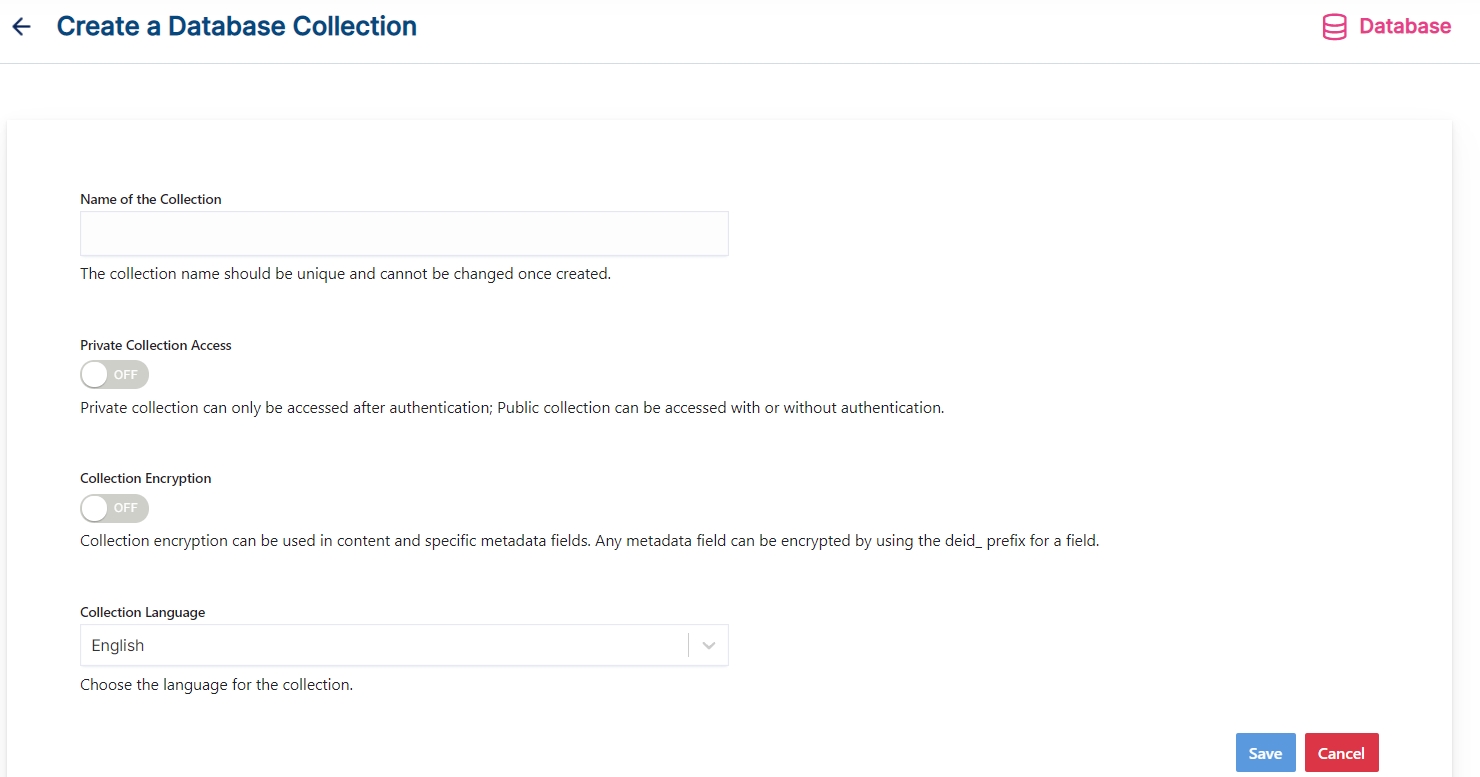
- Once the DB collection is created you will be taken to the Database Settings tab.
Supported Databases
SearchBlox databases for database collection indexing include:
- MySQL
- SQL Server
- Oracle
- PostgreSQL
- Other Applications supported through Database Collection
| Supported Connectors | Supported Connectors | Supported Connectors | Supported Connectors | Supported Connectors | Supported Connectors | Supported Connectors | Supported Connectors |
|---|---|---|---|---|---|---|---|
| AAS | Azure Synapse | eBay Analytics | Google Directory | MongoDB | Sage 50 UK | Snapchat Ads | xBase |
| Access | Azure Table Storage | EdgarOnline | Google Drive | MYOB | Sage Business Cloud Accounting | Snowflake | X-Cart |
| Act CRM | BaseCamp | Elasticsearch | Google Search | NetSuite | Sage Intacct | Spark SQL | Xero |
| Active Directory | BigCommerce | Google Spanner | OData | Salesforce | Splunk | Xero Workflow Max | |
| Act-On | Bing | EnterpriseDB | Google Sheets | Odoo | Salesforce Chatter | CDATA SQL Server | XML |
| Acumatica | Bing Ads | Epicor ERP | GraphQL | Office 365 | Salesforce Pardot | SSAS | YouTube Analytics |
| ADLS | Box | Evernote | GreenPlum | OneDrive | SAP BusinessObject DI | Streak | Zendesk |
| Adobe Analytics | Btrieve | Exact Online | HDFS | OneNote | SAP Business One | Stripe | Zoho Books |
| Airtable | Bugzilla | Excel | Highrise | Open Exchange Rates | SAP Business One DI | SugarCRM | Zoho CRM |
| Alfresco | Bullhorn CRM | Excel Online | HPCC | Oracle Eloqua | SAP ByDesign | SuiteCRM | Zuora |
| Amazon Athena | Cassandra | Excel Services | HubSpot | Oracle oci | SAP Concur | SurveyMonkey | |
| Amazon DynamoDB | CDS | Exchange | IBM Cloud Object Storage | Oracle Sales Cloud | SAP ERP | Sybase | |
| Amazon Marketplace | Cloudant | IBM Cloud SQL Query | Parquet | SAP Fieldglass | Sybase IQ | ||
| Amazon S3 | CockroachDB | Facebook Ads | PayPal | SAP Gateway | Tableau CRM | ||
| Apache CouchDB | Confluence | FedEx | JDBC-ODBC Bridge | SAP HANA | Tally | ||
| Apache HBase | CosmosDB | Financial Edge NXT | JIRA | CDATA PostgreSQL | SAP HANA XSA | TaxJar | |
| Apache Hive | Couchbase | FinancialForce | JIRA Service Desk | Presto | SAP Hybris C4C | Teradata | |
| Apache Impala | CSV | FreshBooks | JSON | Quandl | SAP SuccessFactors | Trello | |
| Apache Kafka | DocuSign | FreshDesk | Kintone | QuickBase | SAS DataSets | TSheets | |
| Apache Phoenix | DropBox | FTP | LDAP | QuickBooks | SAS Xpt | Twilio | |
| API | Dynamics 365 Business Central | Gmail | QuickBooks Online | SendGrid | |||
| Asana | Dynamics 365 Finance And Operations | Google Ads | LinkedIn Ads | QuickBooks POS | ServiceNow | Twitter Ads | |
| Authorize.Net | Dynamics 365 Sales | Google Ads Manager | Magento | Raiser Edge NXT | SF Marketing Cloud | UPS | |
| Autify | Databricks | Google Analytics | MailChimp | Reckon | SFTP | USPS | |
| Avalara | DataRobot | Google BigQuery | MariaDB | Redis | Sharepoint | Veeva Vault | |
| Avro | DigitalOcean | Google Calender | Marketo | Redshift | ShipStation | Wasabi | |
| AWS Cost Explorer | Dynamics CRM | Google Cloud Storage | MarkLogic | REST | Shopify | Wave Financial | |
| Azure Data Catalog | Dynamics GP | Google CM | Microsoft Planner | RSS | SingleStore | WooCommerce | |
| Azure DevOps | Dynamics NAV | Google Contacts | Microsoft Project | Sage 200 | Slack | WordPress | |
| Azure Resource Management | eBay | Google Data Catalog | Microsoft Teams | Sage 300 | Smartsheet | Workday |
Database Settings
- Database setting values must be set explicitly for Database collections.
- The mandatory settings for Database collection for databases like MySQL, Oracle, etc., are
- Database Type
- Host IP/Name
- Host Port No
- Database Name
- Database Username
- Database Password
- SQL Query
- The mandatory settings for Database collection for External DB Connectors are
- Database Type
- Database URL String
- SQL Query
- SearchBlox comes pre-configured with parameters when a new collection is created, but you can also select your preferred setting values for database collections.
- The following table has the list of settings available in Database collection
| Field | Description |
|---|---|
| Database Type | Database to be indexed. SearchBlox supports MySQL, SQL Server, Oracle, PostgreSQL, and other drivers. The list of other drivers supported by SearchBlox is provided here: Supported DB Connectors |
| Database URL String | The database URL string has to be specified for Supported DB Connectors |
| Host IP/name | IP address or name of the database host. (Default value is localhost). |
| Host Port No. | Port number of the database. |
| Database Name | Name of the database in which the tables are created. |
| Database Username | Username of the database. |
| Database Password | Password of the database. |
| SQL Query | SQL Query to fetch the table for indexing. example |
| Relevance - Remove Duplicates | Avoids the indexing of duplicate documents, i.e., documents which have the same exact content. The default is NO |
| Relevance - Stemming | Stemming considers the inflected words of the root form within the search page. For example, "running", "runs", and "ran" are all inflected forms of run. The default is YES. |
| Relevance - Spelling Suggestions | Provide spelling suggestions for the collection. The default is YES. |
| Keyword-in-Context Display | The keyword-in-context returns search results with the description displayed from content areas where the search term occurs. |
| SQL Settings - Fetch Size | Specifies the maximum number of records that can be fetched from the database in every request. The default is 100. |
| Enable Detailed Log Settings | When debug mode is enabled, indexing activity gets logged in detail within the index.log. Log details include: Indexing status of each URL along with timestamp, URL indexing status along with timestamp, status code and time taken for indexing. By default this is set to NO |
| Enable Content API | Provides the ability to crawl the document content with special characters included. |
After saving the Database settings, test the connection. The connection has to be successful for
indexing to take place.
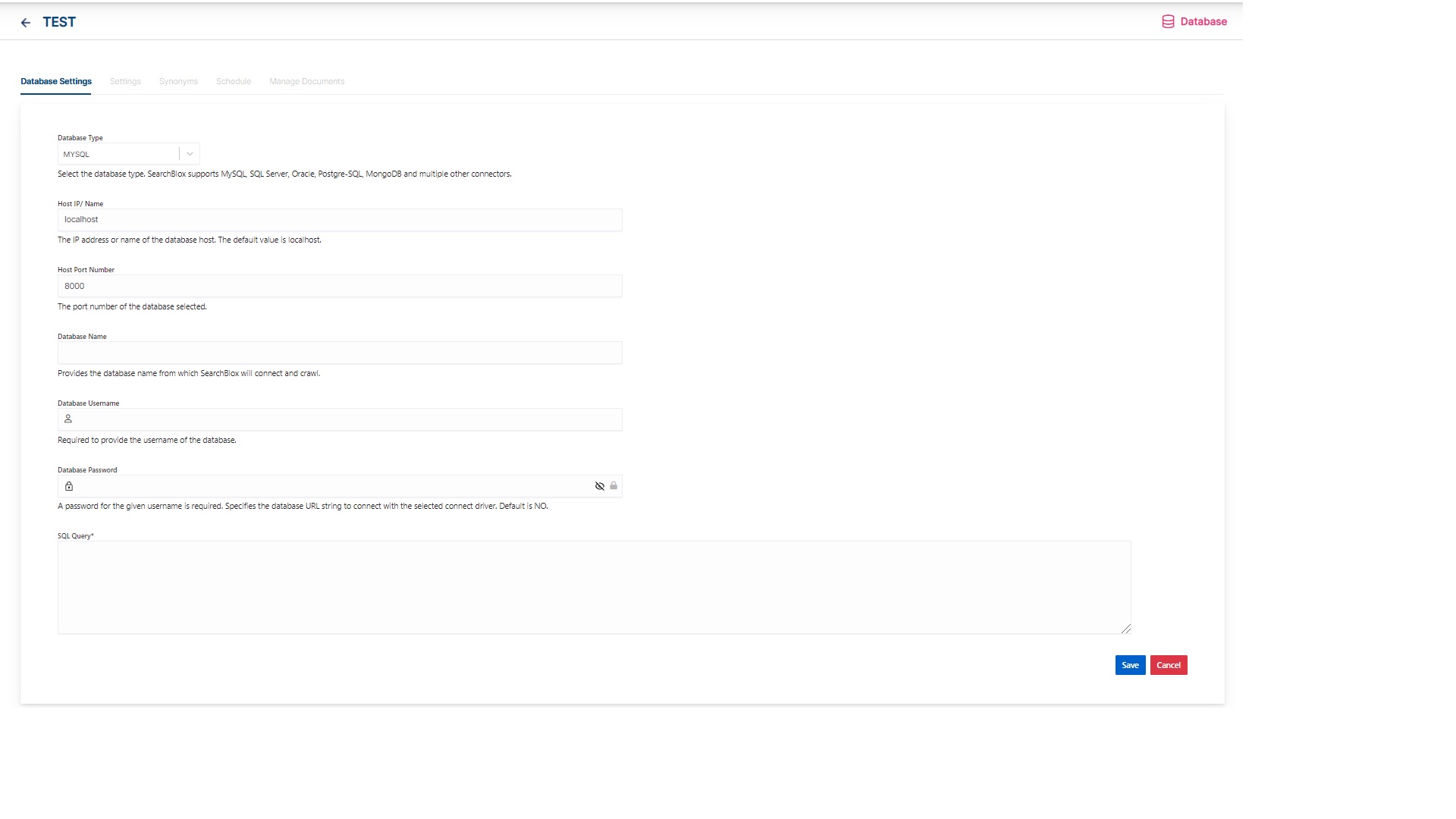
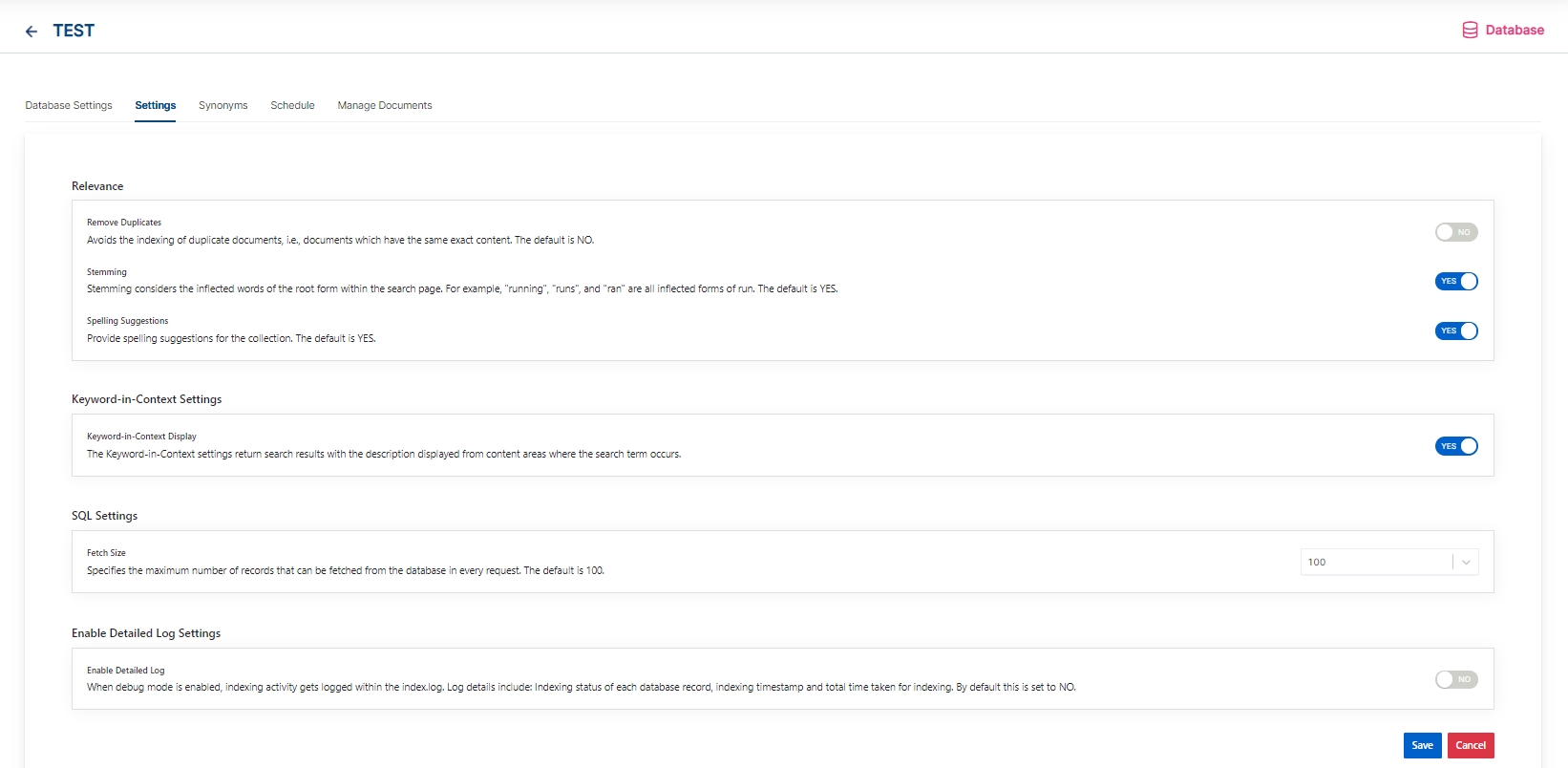
Schedule and Index
Sets the frequency and the start date/time for indexing a collection. Schedule Frequency supported in SearchBlox is as follows:
- Once
- Hourly
- Daily
- Every 48 Hours
- Every 96 Hours
- Weekly
- Monthly
The following operations can be performed in Database collections.
| Action | Description |
|---|---|
| Schedule | For each collection, indexing can be scheduled based on the above options. |
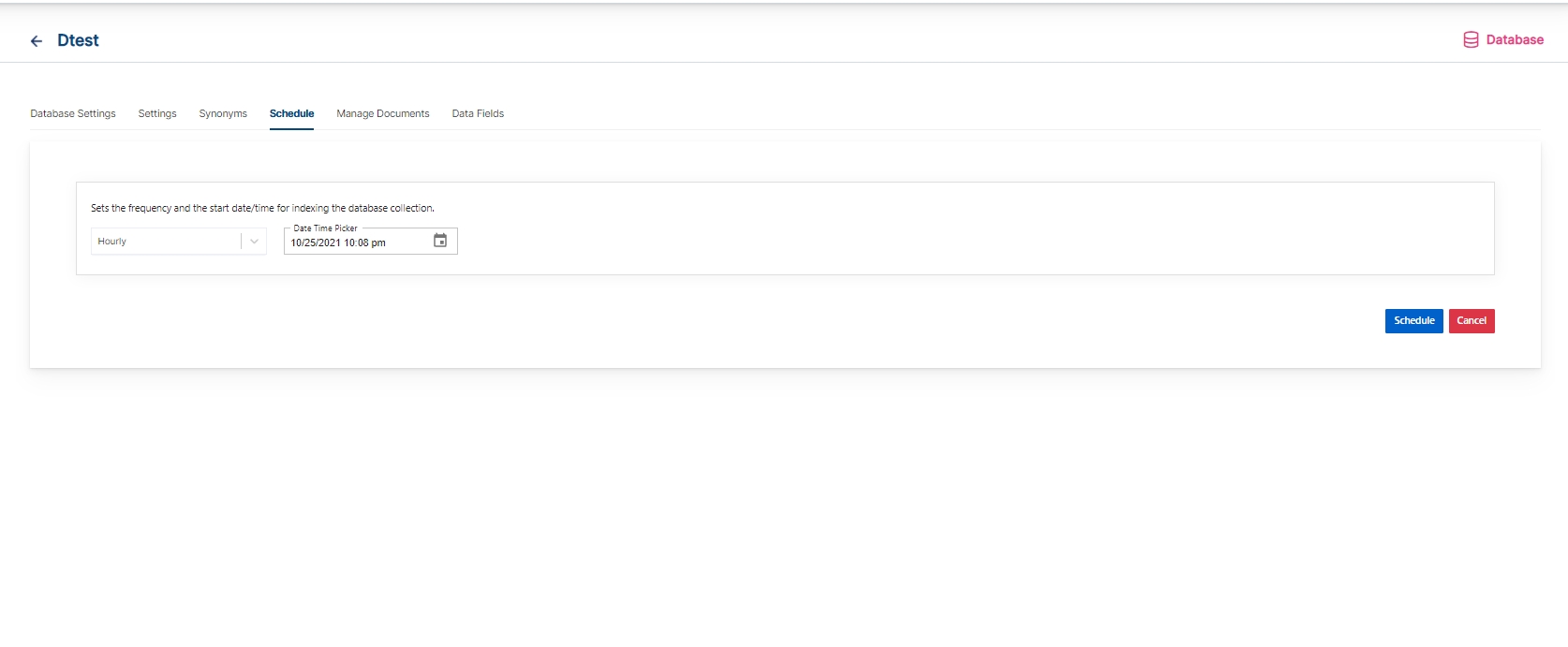
Data Fields Tab
Using Data Fields tab we can create custom fields for search and we can see the Default Data Fields with non-encrypted collection. SearchBlox supports 4 types of Data Fields as listed below:
Keyword
Number
Date
Text
- Once the Data fields are configured, collection must be cleared and re-indexed to take effect.
To know more about Data Fields please refer to Data Fields Tab
Best Practices
- Please check the type of application/database that is to be indexed and provide the database settings accordingly.
- If you do not have any unique id to map in SQL SELECT query, create a view with a unique id and use the same in the SELECT query to fetch the data.
- If you have multiple collections, always schedule the activity to prevent more than 2-3 collections indexing at the same time.
Viewing Search Results
- View the search results by searching for the records here: https://localhost:8443/search/index.html.
- After clicking the search results, the data will appear in a grid format.
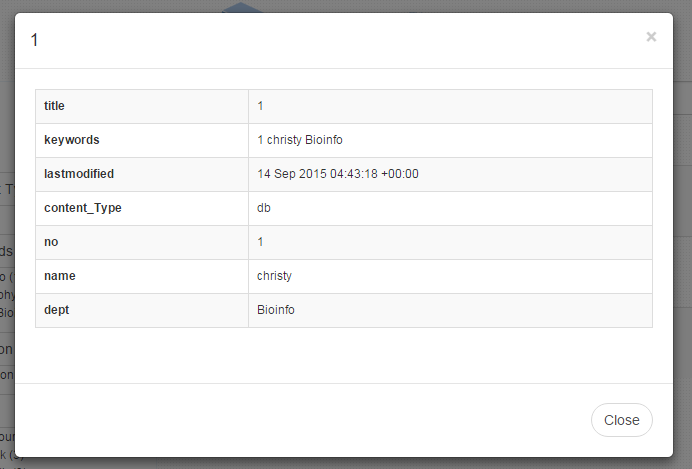
If you want search results in the grid view, use SearchBlox's Database plugin. Learn more about Database Search
Updated over 3 years ago
